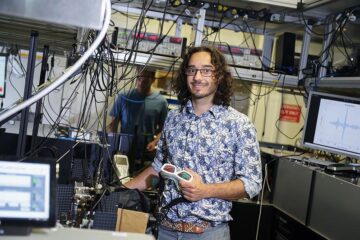Molecular Glue

Pyrococcus furiosus (“rushing fireball”) was named for the ability of this archaeal coccus to rapidly swim at its optimal growth temperature, around 100°C. Early electron microscopic studies identified up to 50 cell surface appendages originating from one pole of the coccus, which have been called flagella. Scientists of the University of Regensburg found that P. furiosus cells could adhere via their flagella to carbon-coated gold grids used for electron microscopic analyses, to sand grains collected from the original habitat and to various other surfaces. P. furiosus grew
on surfaces in biofilm-like structures, forming microcolonies with cells interconnected by flagella and adhering to the solid supports. Therefore, they concluded that P. furiosus probably uses flagella for swimming but that the cell surface appendages also enable this archaeon to form cable-like cell-cell connections and to adhere to solid surfaces. The invention describes the genetic engineering of the molecular structure of the flagellum for the biotechnological production of a molecular glue for many purposes.
Weitere Informationen: PDF
Bayerische Patentallianz GmbH
Tel.: +49 89 5480177-0
Ansprechpartner
Peer Biskup
Media Contact
Alle Nachrichten aus der Kategorie: Technologieangebote
Neueste Beiträge

Neue universelle lichtbasierte Technik zur Kontrolle der Talpolarisation
Ein internationales Forscherteam berichtet in Nature über eine neue Methode, mit der zum ersten Mal die Talpolarisation in zentrosymmetrischen Bulk-Materialien auf eine nicht materialspezifische Weise erreicht wird. Diese „universelle Technik“…

Tumorzellen hebeln das Immunsystem früh aus
Neu entdeckter Mechanismus könnte Krebs-Immuntherapien deutlich verbessern. Tumore verhindern aktiv, dass sich Immunantworten durch sogenannte zytotoxische T-Zellen bilden, die den Krebs bekämpfen könnten. Wie das genau geschieht, beschreiben jetzt erstmals…

Immunzellen in den Startlöchern: „Allzeit bereit“ ist harte Arbeit
Wenn Krankheitserreger in den Körper eindringen, muss das Immunsystem sofort reagieren und eine Infektion verhindern oder eindämmen. Doch wie halten sich unsere Abwehrzellen bereit, wenn kein Angreifer in Sicht ist?…

















